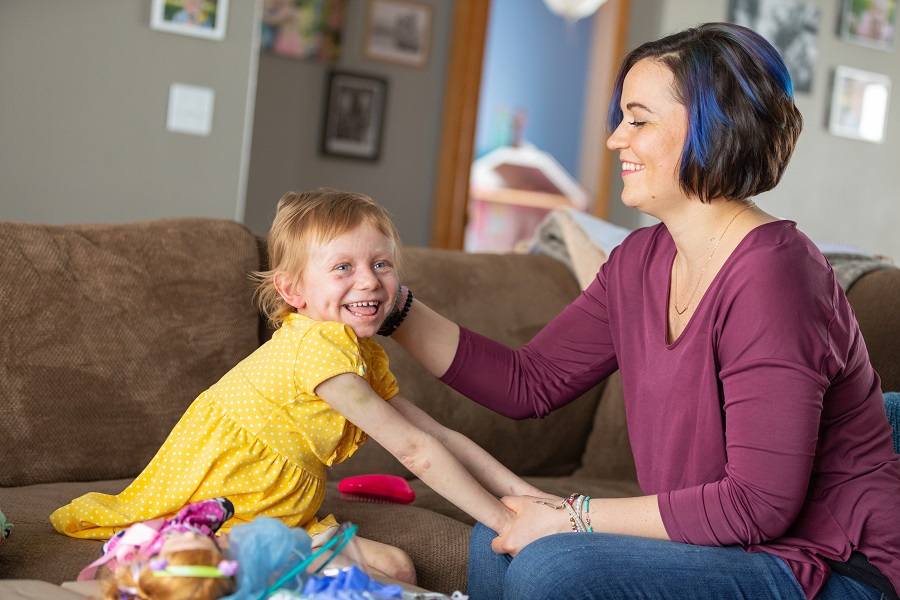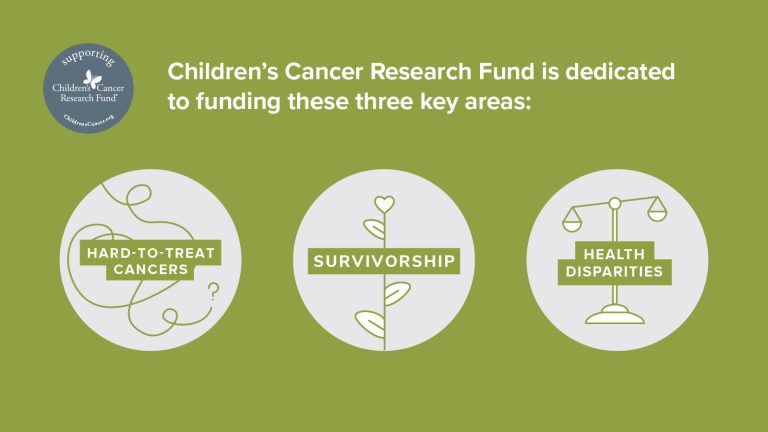When you’re caring for a child with cancer, self-care could easily be the last thing on your mind. Caregivers frequently hear phrases like “you have to take care of yourself to care for your child” or “you can’t pour water from an empty cup,” but self-care isn’t easy when all your energy is going towards your child. CCRF asked caregivers how they care for themselves during their child’s cancer treatment – here are the takeaways.
Recognize your emotions as valid.
Whatever you are feeling, whether it be anger, grief, exhaustion or anything else, is OK. Allow yourself a moment to recognize those feelings and acknowledge that they may be different than your child’s, your spouse’s, or anyone else who is going through hard times – and that’s OK.
“For me, sometimes self-care was allowing myself to be angry, disappointed or sad. It’s OK to have those emotions and to let them out. I called them “Lt. Dan” moments – like in Forrest Gump when Lt. Dan faces the hurricane. It ended up being such a needed release.” – Nancy
“Say no to guilt. When I needed to step out of the hospital room to do some laps around the halls or around the building, no, I’m not going to feel guilty about it. There’s a team of nurses who love my son and take care of him while I’m doing this. When I needed to sit on the bathroom floor and cry and mourn… No, I’m not going to feel guilty because I’m not “being strong enough” for us. When I was feeling sorry for myself… No, I’m not going to feel guilty because others have it worse.” – Casi
Find a way to express yourself.
When it comes to childhood cancer, it is difficult for anyone to understand what you’re going through unless they have gone through it themselves. This is why it’s so important to find ways to express yourself in a way that allows you to feel heard. This can be meeting with a friend who is a good listener, taking private time to collect your own thoughts, starting a public blog or keeping a private journal – whatever works best for you.
“I needed to write. It was a very visceral release, as though all of the emotions building up inside of me and threatening to suffocate me were released through my fingertips. This left room to refuel myself with images and thoughts that helped me survive while I fought alongside my son.” – Michel
“I wrote in my blog and it was so cathartic for me. I wouldn’t leave Mac… couldn’t, but writing even when I was in the same room with him allowed me to feel like I was being heard.” - Marsha
Seek and accept help from others.
Try to share the load you carry every day with others who love you and your child. Communicate with your spouse or significant other about what both of you need. Discuss how you can give each other breaks and what gives you both comfort. Don’t be afraid to ask for help or accept it when it’s offered – your friends and family want to help you. Allow the people around you to lift a little of the weight off your shoulders.
“My husband would come by the hospital most nights with a treat for me and I would take a break outside the room. It really helped. I also learned to let go and let others do my laundry, clean the house and cook. At times though, those normal activities were soothing. We had a wonderful support system in place!” - Dee
“One of the most impactful things was asking others to pray for me. It was really strange, but I couldn’t pray for Ian because saying it in a prayer made it so real. I also didn’t feel like I had enough brain power to pray hard enough. Also – understand that you can’t have the same expectations of yourself as a parent, so accepting help in the form of meals, housekeeping and your budget was crucial in our family’s survival.” - Kay
Take care of your physical and mental health.
Long hospital stays often mean less than nutritious food and lots of sitting. When you can, try to pack snacks that are nutritious and easy to prepare, or ask for this when friends offer to bring you something. Do your best to find ways to exercise, whether that means a quick walk outside or a few minutes to go up and down the stairs. If your mental health is suffering, seek professional help in learning how to cope. All of these can help you clear your head and stay healthy enough to care for your child.
“Mike and I asked the social worker if we could use the gym at the hospital. She said no one had ever asked this before, but she called and they let us use it for a low rate. Three years of treatment and we never stopped making our health a priority. It was important to Nevaeh that we didn’t sit around and be sad, so we got all our stress out at the gym.” – Tessa
“The basics have been most important to me – healthy diet, good sleep and riding my bike and swimming. At diagnosis something told me I needed to keep a balance because this could be a long road. We are approaching 10 years in our challenge.” - Debbie
“I saw a doctor and started an anti-anxiety med about three months after Wyatt was diagnosed, and it helped me tremendously. I’d had mild anxiety before he was diagnosed, but kept putting off doing anything about it. I knew I had to take care of myself to get through the marathon of treatment ahead.” – Whitney
Get some fresh air.
When your time is spent in a hospital with a sick child, you can start to forget what fresh air feels like. Take some time, even just a few minutes, to get outside and clear your head. Even if it’s just in the area around the hospital or your home, getting some sunlight and fresh air can allow you to breathe deeply, gain perspective and prepare to be there for your child.
“I discovered a nature preserve near the hospital where my daughter was treated. I would take an hour walk by myself in the woods – headphones blasting my favorite tunes. It saved my mental health.” - Jenny
“When our daughter was in for her longest stretch, my husband and I went over a week without going outside, barely leaving her side. It was so shocking to me how much just five minutes outside rejuvenated me.” – Rebecca
Practice Deep Breathing.
Your body's physical response to stress can be real and dramatic, but you can start the process of calming your system down with just a few breaths. This takes less than a minute and can be done wherever you are. Close your eyes and breathe deeply - your abdomen should rise, but your shoulders should not. Count to three, then slowly release your breath. Do this whenever you need to feel more relaxed or focused.
"If I was staying the night at the hospital I would put my earbuds in and listen to spa music. I also tried breathing apps - anything to calm my nerves." - Dawn
“When I feel like the world is closing in on me and my heart starts to race or my jaw is clenched and my neck is stiff, I stop and breathe. It can happen any time, in traffic, before I have an intense conversation or during one of my son’s seizures. I stop and breathe, deep slow breaths for as long as needed or that I can. The air around us can be our best immediate tool to help feel calm and in control when we are faced with all of things we can’t.” - Mindy
Help Raise Awareness by Sharing Your Story
Sharing your story is a powerful way to raise awareness for childhood cancer research. If you would like to share your story, fill out our Share Your Story form and one of our outreach coordinators will get in touch with you.




